-
REVIEW
Nursing process in mental health: an integrative literature review
Revista Brasileira de Enfermagem. 2017;70(1):220-230
01-01-2017
Abstract
REVIEWNursing process in mental health: an integrative literature review
Revista Brasileira de Enfermagem. 2017;70(1):220-230
01-01-2017DOI 10.1590/0034-7167-2016-0031
Views0See moreABSTRACT
Objective:
to identify evidences from the literature on the application of nursing process in care developed by the nurse in mental health.
Method:
integrative literature review between 1990 and 2013, in the PubMed, Scopus, CINAHL and LILCACS bases. Descriptors: nursing processes, mental health, nursing care.
Results:
19 papers were identified. Limited and partial usage of the nursing process in care established by a therapeutic relationship that respects the patient’s individuality. We observe care proposals systematized for patients that present pathological aspects in the limits between the physical and psychical, which might be a response to the influence of the practice based on evidences.
Conclusion:
it was found an antagonistic movement between care based on the relationship and located in the standardization of diagnoses that respond to physical malaise. A lack of evidence was verified for the usage of the nursing process in mental health, and we point at the necessity for the creation of new possibilities for dialogue between relational and biological perspectives.
-
REVIEW
Nursing practice in home care: an integrative literature review
Revista Brasileira de Enfermagem. 2017;70(1):210-219
01-01-2017
Abstract
REVIEWNursing practice in home care: an integrative literature review
Revista Brasileira de Enfermagem. 2017;70(1):210-219
01-01-2017DOI 10.1590/0034-7167-2016-0214
Views0See moreABSTRACT
Objective:
analyze scientific production on nursing practice in home care.
Method:
integrative review employing databases LILACS, BDENF, IBECS, and MEDLINE. Studies in Spanish, English, and Portuguese were included, regardless of publishing date.
Results:
after analyzing 48 articles, it was found that nursing practice in home care is complex, employing a multitude of actions by using three technologies: soft; soft-hard especially; and hard. Challenges related to the home-care training process are reported in the literature. Nurses use knowledge from their experience and scientific recommendations in conjunction with their reflections on the practice.
Conclusion:
home nursing practice is fundamental and widespread. Relational and educational actions stand out as necessary even in technical care, with a predominant need for home-care training.

-
REVIEW
Nonpharmacological interventions to improve quality of life in heart failure: an integrative review
Revista Brasileira de Enfermagem. 2017;70(1):198-209
01-01-2017
Abstract
REVIEWNonpharmacological interventions to improve quality of life in heart failure: an integrative review
Revista Brasileira de Enfermagem. 2017;70(1):198-209
01-01-2017DOI 10.1590/0034-7167-2016-0112
Views0See moreABSTRACT
Objective:
to identify articles that assessed the effectiveness or efficacy of nonpharmacological interventions to improve quality of life of people with heart failure in the literature.
Method:
an integrative literature review was performed in Lilacs, MedLine and SciELO databases, including randomized or nonrandomized clinical trials and quasi-experimental studies published between 2003 and 2014, in Portuguese, English or Spanish.
Results:
twenty-three studies were included. The categories of nonpharmacological interventions that improved quality of life of people with heart failure were: Remote health monitoring, Instructions on health practices, Physical activity follow-up and Traditional Chinese Medicine practices.
Conclusion:
these results can guide the selection of interventions to be implemented by health professionals that treat people with heart failure. Future systematic reviews with meta-analyses are needed in order to identify the most effective interventions for improving these individuals’ quality of life.

-
REVIEW
Quality of working life: assessment of intervention studies
Revista Brasileira de Enfermagem. 2017;70(1):189-197
01-01-2017
Abstract
REVIEWQuality of working life: assessment of intervention studies
Revista Brasileira de Enfermagem. 2017;70(1):189-197
01-01-2017DOI 10.1590/0034-7167-2015-0069
Views0See moreABSTRACT
Objective:
to analyze the production of knowledge about interventions on quality of working life.
Method:
integrative review study. The following databases were used for study selection: SciELO, Medline and PubMed.
Results:
the sample included 25 national and international articles that described programs and methods to acquire healthy habits at the workplace and attenuate its mental demands.
Conclusion:
by observing the number of businesses throughout the world, a low number of programs addressing workers’ health and well-being can be found, and the establishment of efficient policies at institutions could improve this situation.

-
REVIEW
Health literacy for people living with HIV/Aids: an integrative review
Revista Brasileira de Enfermagem. 2017;70(1):180-188
01-01-2017
Abstract
REVIEWHealth literacy for people living with HIV/Aids: an integrative review
Revista Brasileira de Enfermagem. 2017;70(1):180-188
01-01-2017DOI 10.1590/0034-7167-2015-0052
Views0See moreABSTRACT
Objective:
to analyze knowledge produced by research about health literacy for adult with HIV/Aids.
Method:
an integrative literature review, using six databases, was conducted between January and April of 2014. The descriptors aids and Health Literacy were used, in Portuguese, English and Spanish. A total of 130 articles were found and 14 were selected. Three categories were identified: educational technologies and health literacy for HIV/Aids; assessment of health literacy of patients with HIV/Aids; and health literacy and adherence to antiretroviral therapy.
Results:
analysis of health literacy, socioeconomic status and educational level of people living with HIV/ Aids was essential for implementation of educational strategies that increased adherence to health guidance.
Conclusion:
this study showed the importance of health literacy for working with people living with HIV/Aids, especially considering individuals who did not possess the minimum necessary for survival, which makes it relevant and encourages further research on the topic.

-
REVIEW
Letramento em saúde para pessoas com HIV/Aids: revisão integrativa
Revista Brasileira de Enfermagem. 2017;70(1):180-188
01-01-2017
Abstract
REVIEWLetramento em saúde para pessoas com HIV/Aids: revisão integrativa
Revista Brasileira de Enfermagem. 2017;70(1):180-188
01-01-2017DOI 10.1590/0034-7167-2015-0052
Views0See moreRESUMEN
Objetivo:
analizar el conocimiento producido por la investigación sobre la salud de alfabetización para adultos con VIH/SIDA.
Método:
una revisión integradora de la literatura, con seis bases de datos, se llevó a cabo entre enero y abril de 2014. Los descriptores SIDA y Educación de la Salud se utilizaron, en portugués, inglés y español. Se encontró un total de 130 artículos y se seleccionaron 14. Se identificaron tres categorías: tecnologías de la educación y alfabetización de la salud para el VIH/SIDA; evaluación de conocimientos sobre la salud de los pacientes con VIH/SIDA; y conocimientos sobre la salud y la adherencia a la terapia antirretroviral.
Resultados:
análisis de los conocimientos sobre la salud, el estatus socioeconómico y nivel educativo de las personas que viven con el VIH / SIDA era esencial para la implementación de estrategias educativas que el aumento de la adherencia a la orientación de la salud.
Conclusión:
Este estudio demostró la importancia de la alfabetización en salud para trabajar con personas que viven con el VIH / SIDA, especialmente teniendo en cuenta a las personas que no poseen el mínimo necesario para la supervivencia, lo que hace que sea aún más relevante y alienta la investigación sobre el tema.
-
Factors that interfere with the response of nurses in the monitoring of clinical alarms
Revista Brasileira de Enfermagem. 2017;70(1):172-179
01-01-2017
Abstract
Factors that interfere with the response of nurses in the monitoring of clinical alarms
Revista Brasileira de Enfermagem. 2017;70(1):172-179
01-01-2017DOI 10.1590/0034-7167-2015-0092
Views0See moreABSTRACT
Objective:
The objective of the present study was to identify and synthesize the best empirical evidence found on factors that influence the response of nurses regarding clinical alarms.
Method:
An integrative literature review was conducted with searches undertaken in ten electronic databases restricted to the period from 2005 to 2016.
Results:
Eight articles were included by cross-checking the descriptors selected.
Conclusion:
In the analysis of the studies, the following possible factors that might interfere with the response of nurses in the monitoring of clinical alarms were found: high number of false alarms, inaudibility of alarms due to the competition of sounds, difficulty in distinguishing the urgency of alarms, and increase in noise caused by the raise in the number of alarms.
-
RESEARCH
Discourses on discharge care for children with special healthcare needs
Revista Brasileira de Enfermagem. 2017;70(1):163-171
01-01-2017
Abstract
RESEARCHDiscourses on discharge care for children with special healthcare needs
Revista Brasileira de Enfermagem. 2017;70(1):163-171
01-01-2017DOI 10.1590/0034-7167-2016-0248
Views0See moreABSTRACT
Objectives:
analyze the discourse of healthcare professionals and families on the continuous and complex care for children with special healthcare needs; understand hospital discharge as a process centered on children demands and family learning.
Method:
qualitative research conducted between 2013 and 2015 through semi-structured interviews, document analysis and the sensitive creative method; the participants were ten children with special healthcare needs, six professionals and eleven family members from a public pediatric teaching hospital in Rio de Janeiro. The data underwent critical discourse analysis.
Results:
at discharge, family caregivers should learn innovative care to guarantee the maintenance of their children’s lives at home, but preparation is limited.
Conclusion:
the clinicians and the families pointed out Nurse as the most qualified professional for this preparation, since caring for these children requires nursing care skills.
-
ORIGINAL ARTICLE
Guide for Systematization of Care and Nursing Process: educational technology for professional practice
Revista Brasileira de Enfermagem. 2023;76:e20210975
04-14-2023
Abstract
ORIGINAL ARTICLEGuide for Systematization of Care and Nursing Process: educational technology for professional practice
Revista Brasileira de Enfermagem. 2023;76:e20210975
04-14-2023DOI 10.1590/0034-7167-2021-0975
Views1ABSTRACT
Objective:
to elaborate and validate the content of a digital guide educational technology on Systematization of Nursing Care and Nursing Process.
Methods:
applied research of technological development, developed between 2020 and 2021, in three steps. First, a scoping review was carried out to elaborate the content. In the second step, the content was validated with 46 nurse judges selected for convenience. The minimum criterion of agreement among judges was 80%. The third step consisted of content organization and layout.
Results:
the guide content was elaborated from the Federal Nursing Council legislation, scientific articles and textbooks. Content was considered appropriate, relevant and organized by judges.
Final considerations:
the digital guide is an alternative that can contribute to the NP execution and implementation, supporting the planning and implementation of actions for quality of care.
Keywords:Educational TechnologyNursing ProcessNursing RecordsProfessional PracticeStandardized Nursing TerminologySee more
-
ORIGINAL ARTICLE
Adaptation and validation of an adult patient classification instrument with emphasis on the family dimension
Revista Brasileira de Enfermagem. 2023;76(2):e20220530
03-27-2023
Abstract
ORIGINAL ARTICLEAdaptation and validation of an adult patient classification instrument with emphasis on the family dimension
Revista Brasileira de Enfermagem. 2023;76(2):e20220530
03-27-2023DOI 10.1590/0034-7167-2022-0530
Views1ABSTRACT
Objectives:
to adapt and validate an instrument for classifying adult patients that emphasizes the family support network in the demand for nursing care.
Methods:
methodological study, carried out in three phases: adaptation of an instrument considering the reality of adult patients; content validation with seven experts and assessment of measurement properties (construct validity and internal consistency) with 781 hospitalized patients.
Results:
in content validation, the indicators reached the values established for the Content Validity Index (0.85-1.00). In the confirmatory factor analysis, the 11 indicators were distributed in three domains and presented average variance extracted and factor loading greater than 0.5. Composite reliability was greater than 0.7.
Conclusions:
the present study adapted and made available, with evidence of validity and reliability, an instrument for classifying adult patients that considers the family support network in the demand for nursing care.
Keywords:Factor AnalysisFamilyHospital Organization and AdministrationPatient-Centered CareValidation StudiesSee more
-
ORIGINAL ARTICLE
Self-care of elderly people with diabetes mellitus and the nurse-patient interpersonal relationship
Revista Brasileira de Enfermagem. 2022;75(1):e20201257
10-01-2022
Abstract
ORIGINAL ARTICLESelf-care of elderly people with diabetes mellitus and the nurse-patient interpersonal relationship
Revista Brasileira de Enfermagem. 2022;75(1):e20201257
10-01-2022DOI 10.1590/0034-7167-2020-1257
Views1INTRODUCTIONChronic non-communicable diseases are the main causes of death and health problems in the world, causing about 41 million deaths each year, which corresponds to approximately 71% of all deaths. Among these diseases, diabetes mellitus has stood out due to the increase in its incidence and prevalence().Estimates indicate that 463 million people live with diabetes […]See more -
Evolution of nursing teaching in the use of education technology: a scoping review
Revista Brasileira de Enfermagem. 2021;74:e20200422
05-21-2021
Abstract
Evolution of nursing teaching in the use of education technology: a scoping review
Revista Brasileira de Enfermagem. 2021;74:e20200422
05-21-2021DOI 10.1590/0034-7167-2020-0422
Views1See moreABSTRACT
Objective:
To identify and map the technological tools of information and communication to support the teaching learning process in Nursing teaching courses.
Methods:
This is a scoping review whose search was carried out in seven databases and in grey literature. After an initial analysis of the selection, 88 texts were read integrally, and 29 made up the final sample.
Results:
Virtual learning environment and object, simulation, hypermedia, and software or cellphone applications were the tools the nursing professors used the most. Studies highlight that the application of technology was important in the teaching-learning process, since it encouraged teaching based on safe care, motivating and developing abilities/competences, supported on significant, effective, flexible, and autonomous learning.
Conclusion:
The contribution of the technology for nursing formation stands out, but it should be highlighted that its employment must be critical, reflective, based on pedagogical theories and developed by trained professors.

-
EXPERIENCE REPORT
Hypothermia post-cardiopulmonary resuscitation with low inputs: an experience report
Revista Brasileira de Enfermagem. 2019;72(4):1114-1118
08-19-2019
Abstract
EXPERIENCE REPORTHypothermia post-cardiopulmonary resuscitation with low inputs: an experience report
Revista Brasileira de Enfermagem. 2019;72(4):1114-1118
08-19-2019DOI 10.1590/0034-7167-2017-0771
Views1ABSTRACT
Objective:
to report the experience of conducting directed temperature control of a post-cardiopulmonary resuscitation patient, with reduced and basic inputs available at the institution.
Method:
an experience report of directed temperature control in patient (age 15 years), after four hours of cardiopulmonary resuscitation in an Intensive Care Unit of a hospital in São Paulo State countryside in 2016, according to the protocol suggested by the American Heart Association, in 2015. There were applications of cold compresses, plastic bags with crushed ice and rectal temperature control.
Results:
after eight hours, temperature had reached 93.2 ºF. Body cooling was maintained for 24 hours. However, bags with crushed ice were used in the first 6 hours.
Conclusion:
conduct of nurses to obtain the body cooling with reduced and basic inputs was effective during the stay at the Intensive Care Unit.
Keywords:Body Temperature RegulationCardiopulmonary ResuscitationHeart ArrestHypothermia InducedIntensive Care UnitsSee more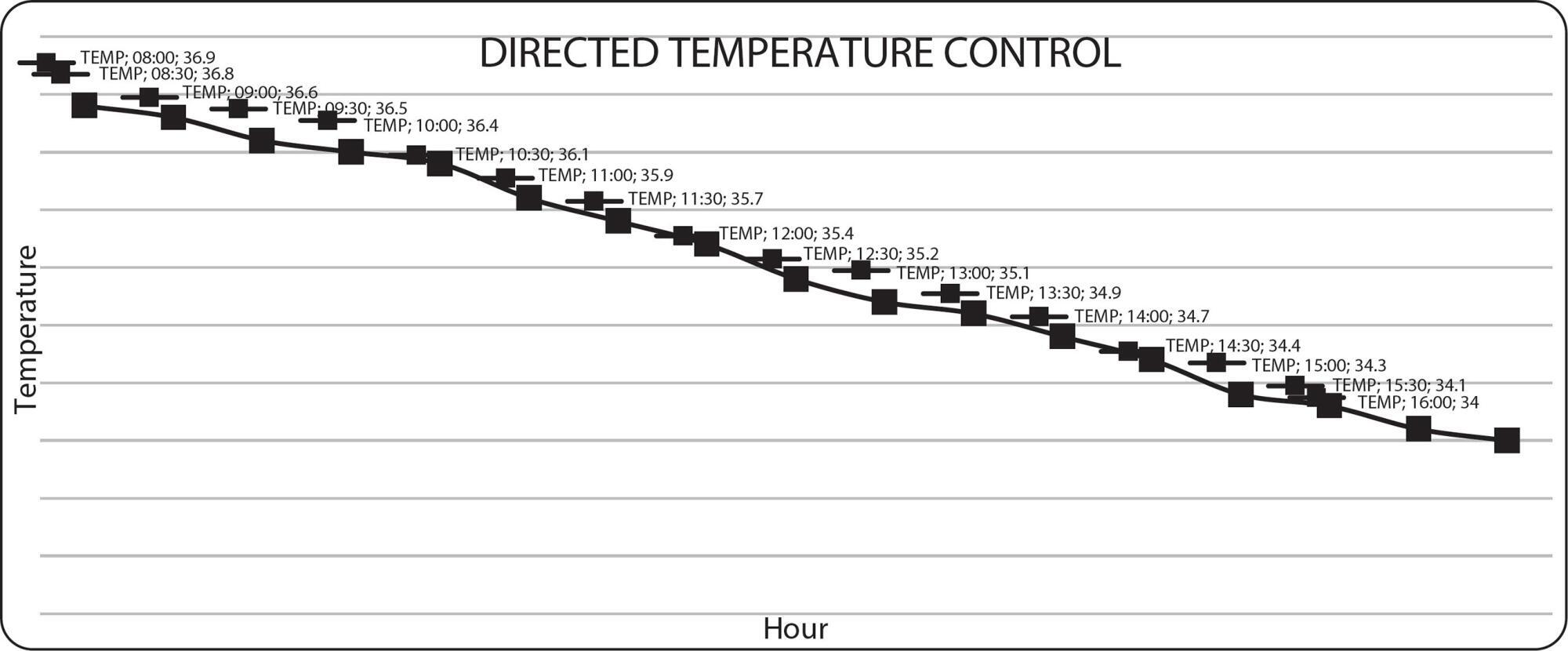
-
ORIGINAL ARTICLE
Curricular reforms in the transformation of nursing teaching in a federal university
Revista Brasileira de Enfermagem. 2021;74(4):e20201242
07-30-2021
Abstract
ORIGINAL ARTICLECurricular reforms in the transformation of nursing teaching in a federal university
Revista Brasileira de Enfermagem. 2021;74(4):e20201242
07-30-2021DOI 10.1590/0034-7167-2020-1242
Views1See moreABSTRACT
Objectives:
to discuss the curricular reforms adopted for nursing teaching in Brazil, from 1969 to 2019.
Methods:
historical, qualitative approach using the thematic oral history and document research. 13 interviews were carried out with graduation nursing professors from a federal university in the South of Brazil. The document sources were the political-pedagogical projects of the course and their associated documents. Minayo’s thematic analysis was used.
Results:
nursing curricula delineates the profile of the professional that must be formed and are reviewed in order to be adapted to social and educational changes, showing the scientific and professional potential of the nurse. Curricular reforms consider the quality of nursing formation.
Final Considerations:
the structure of the curriculum and the reforms that took place emerged according to the historical, political, epidemiological and social context demanded from the profession, to attend to the demands of society and to the work market.
-
ORIGINAL ARTICLE
Cultural adaptation and validation of an instrument about nursing critical thinking skills
Revista Brasileira de Enfermagem. 2021;74(2):e20200720
05-28-2021
Abstract
ORIGINAL ARTICLECultural adaptation and validation of an instrument about nursing critical thinking skills
Revista Brasileira de Enfermagem. 2021;74(2):e20200720
05-28-2021DOI 10.1590/0034-7167-2020-0720
Views1See moreABSTRACT
Objectives:
to validate the Nursing Critical Thinking in Clinical Practice Questionnaire regarding cultural aspects and metric properties.
Methods:
a methodological research carried out through cross-cultural adaptation, face and content validity, dimensional construct and known groups validity, test-retest reliability and internal consistency. 511 nurses from four hospitals participated in the study, of which 54 participated in retest.
Results:
the instrument validation for Brazilian Portuguese maintained equivalences, according to the original version. The dimensional validity demonstrated adjustment to the tetrafactorial structure of the original version (GFI=0.69). There were statistically significant differences in critical thinking skills between nurses with graduate degrees and who undertook training, reading articles, developing research and working in an institution with a longer time implementation of the Nursing Process. The instrument showed temporal stability (ICC 073-0.84; p<0.001) and adequate internal consistency (α=0.97).
Conclusions:
the instrument proved to be valid and reliable for the studied population.
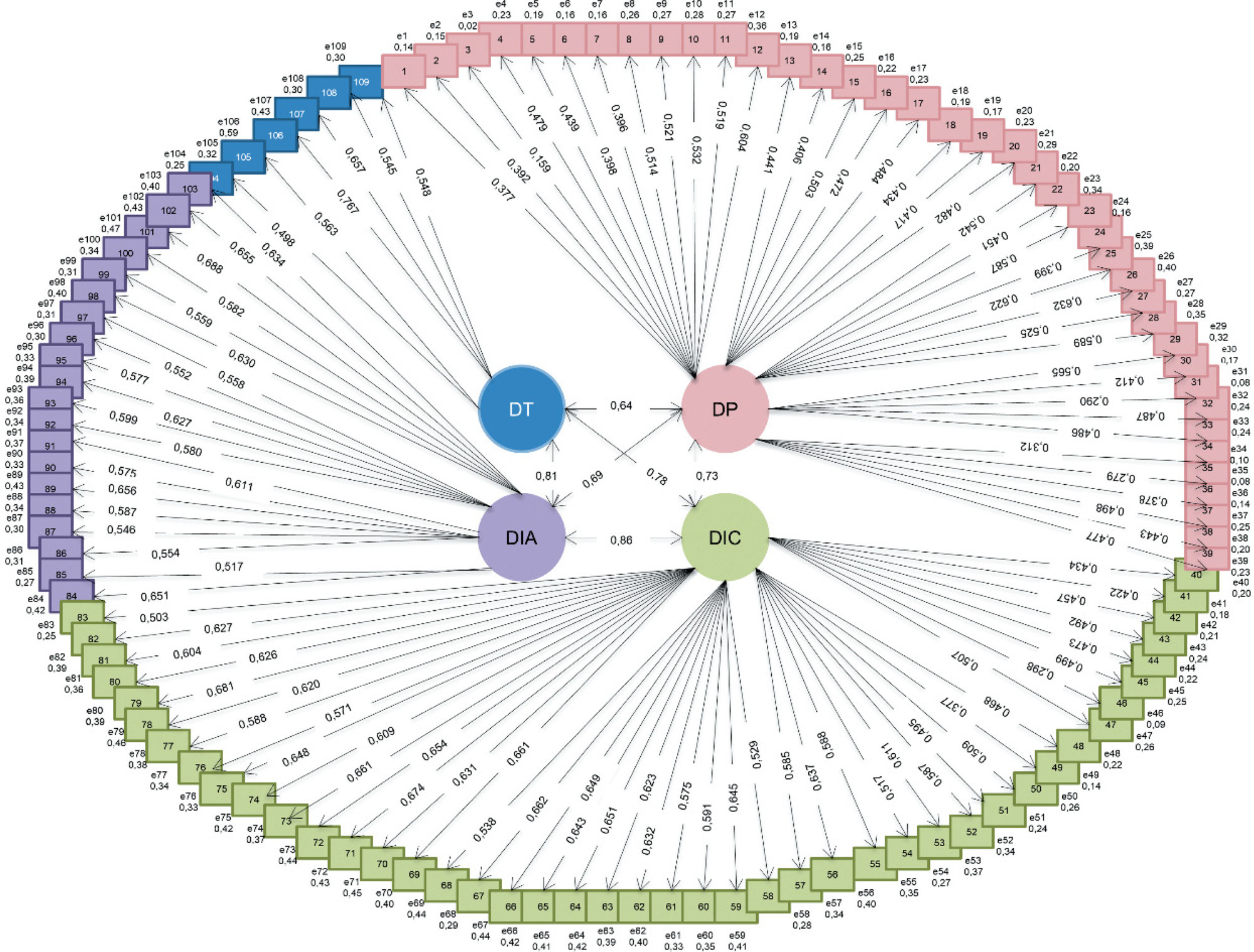
-
ORIGINAL ARTICLE
Prevalence and severity levels of post-radical prostatectomy incontinence: different assessment instruments
Revista Brasileira de Enfermagem. 2021;74(2):e20200692
05-28-2021
Abstract
ORIGINAL ARTICLEPrevalence and severity levels of post-radical prostatectomy incontinence: different assessment instruments
Revista Brasileira de Enfermagem. 2021;74(2):e20200692
05-28-2021DOI 10.1590/0034-7167-2020-0692
Views1See moreABSTRACT
Objectives:
to analyze urinary incontinence prevalence and severity in prostatectomized men assessed by three different instruments.
Methods:
a cross-sectional study was conducted with 152 men. The pad test, pad used, and International Consultation on Incontinence Questionnaire – Short Form (self-report) were considered. Data were analyzed using Spearman’s correlation, Kappa index, considering a significance level of 0.05.
Results:
urinary incontinence prevalence was 41.4%, 46.7% and 80.3% according to pad used, pad test and self-report. Positive correlations and moderate to poor agreement were found between the instruments. As for severity, most participants had mild incontinence. The largest number of cases of mild and severe incontinence was identified by self-report.
Conclusions:
the self-report showed higher values for prevalence of mild and severe severity levels. Through the identified differences, we propose that the objective assessment (pad used and pad test) be associated with individuals’ perception (self-report) to better estimate prevalence and severity.

-
ORIGINAL ARTICLE
Changes implemented in the work environment of nurses in the COVID-19 pandemic
Revista Brasileira de Enfermagem. 2022;75:e20201381
11-29-2022
Abstract
ORIGINAL ARTICLEChanges implemented in the work environment of nurses in the COVID-19 pandemic
Revista Brasileira de Enfermagem. 2022;75:e20201381
11-29-2022DOI 10.1590/0034-7167-2020-1381
Views0See moreABSTRACT
Objective:
to describe the changes implemented in the work environment of nurses in university hospitals considering the COVID-19 pandemic.
Methods:
this qualitative and descriptive research was developed from an online survey with 75 nurses from three Brazilian university hospitals. Data processing occurred through textual analysis with the aid of software IRAMUTEQ.
Results:
five semantic classes were obtained: Organization of units for exclusive care of patients with COVID-19; Adaptations in the use of personal protective equipment; Physical structure adaptation; Care flow institution; Increased number of beds and training courses. Final considerations: the results show the effort of healthcare and nursing professionals/managers in the development of structural adaptations and reorganizations of care processes, in the hospital context, to respond with quality and efficiency to the demands arising from the COVID-19 pandemic.
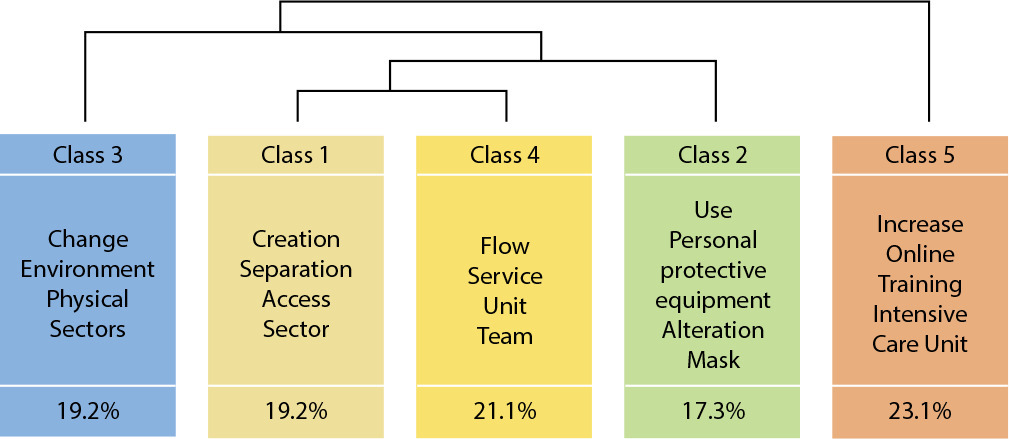
-
ORIGINAL ARTICLE
Permanent education for good practices in the prevention of pressure injury: almost-experiment
Revista Brasileira de Enfermagem. 2019;72(6):1646-1652
10-21-2019
Abstract
ORIGINAL ARTICLEPermanent education for good practices in the prevention of pressure injury: almost-experiment
Revista Brasileira de Enfermagem. 2019;72(6):1646-1652
10-21-2019DOI 10.1590/0034-7167-2018-0778
Views0See moreABSTRACT
Objective:
To verify the effectiveness of the educational intervention through the evaluation of nurses’ knowledge about prevention of pressure injury.
Method:
A quasi-experimental study with a single group, carried out with 95 nurses from a teaching hospital in the interior of Minas Gerais, in August and September 2017. As a teaching strategy, the active methodology and hybrid teaching were used, based on the reference of the Method of the Arch of Charles Maguerez. Data were collected from a validated instrument, called the Pieper Knowledge Test, and analyzed by descriptive statistics and Student’s t-test with significance level of p <0.001.
Results:
The mean number of correct answers obtained by the nurses was 78.8% in the pre-test and 88.8% in the post-test, and the difference was statistically significant (p <0.001).
Conclusion:
The educational intervention developed was effective, since it contributed to the improvement of nurses’ knowledge.

-
ORIGINAL ARTICLE
Nurse care for the hospitalized elderly’s spiritual dimension
Revista Brasileira de Enfermagem. 2019;72:236-242
12-05-2019
Abstract
ORIGINAL ARTICLENurse care for the hospitalized elderly’s spiritual dimension
Revista Brasileira de Enfermagem. 2019;72:236-242
12-05-2019DOI 10.1590/0034-7167-2018-0685
Views0See moreABSTRACT
Objective:
to analyze the nurse care for the spiritual hospitalized elderly’s dimension.
Method:
a qualitative study, based on Jean Watson’s Theory of Human Caring. The study included 17 nurses working in a geriatric center in Salvador City, Bahia State, Brazil. The collection of testimonies occurred between January and April of 2018, through an interview.
Results:
spiritual care were dialogue, encouragement and respect for religious activities, embracement, empathy. One of the obstacles to providing this care was the lack of preparation in accessing the elderly’s spiritual dimension.
Final considerations:
spirituality is a dimension of human and holistic nursing care. Caring for the spirit contributes to foster transpersonal care. The difficulty may be in the lack of nurses’ preparation. It is necessary that they cultivate and live their own spirituality, transmitting the understanding in each care relationship.
-
EXPERIENCE REPORT
Use of webQDA software on qualitative nursing research: an experience report
Revista Brasileira de Enfermagem. 2020;73(3):e20180411
04-03-2020
Abstract
EXPERIENCE REPORTUse of webQDA software on qualitative nursing research: an experience report
Revista Brasileira de Enfermagem. 2020;73(3):e20180411
04-03-2020DOI 10.1590/0034-7167-2018-0411
Views0See moreABSTRACT
Objectives:
to report the user experience of the webQDA software in the support of qualitative data analysis about health literacy of older adults.
Methods:
quasi-experimental research developed from January 2014 to January 2015, with 118 older adults, all of whom were interviewed to assess the level of health literacy. Interviews were carried out before and after four educational interventions, according to Freire’s method named Culture Circle. The interviews were transcribed and entered in the software, which highlighted the analytical categories.
Results:
the systems of sources, interpretative encoding and questioning of the data available in the software allowed the construction of three categories for the literacy levels and four categories for their dimensions.
Final considerations:
We concluded that the webQDA software enables the structured encoding of qualitative materials, ensuring faster and effective management of data with systematization and analytical transparency.

-
Concept analysis of Perioperative Thirst for the development of a new nursing diagnosis
Revista Brasileira de Enfermagem. 2021;74(1):e20200065
03-03-2021
Abstract
Concept analysis of Perioperative Thirst for the development of a new nursing diagnosis
Revista Brasileira de Enfermagem. 2021;74(1):e20200065
03-03-2021DOI 10.1590/0034-7167-2020-0065
Views0See moreABSTRACT
Objectives:
to analyze the perioperative thirst concept for the development of a new diagnostic structure according to NANDA International.
Methods:
a concept analysis study based on the framework proposed by Walker and Avant, instrumentalized through an integrative literature review based on SCOPUS, CINAHL, PUBMED, LILACS, and WOS. The elaboration of the diagnostic structure followed NANDA International guidelines.
Results:
41 studies were analyzed revealing that perioperative thirst is prevalent and intense, having visceral and behavioral attributes as the core of the concept. Antecedents indicate that surgical patients are vulnerable to thirst; and consequents 16 signs and symptoms were organized and model cases were developed. A diagnostic structure has been developed for perioperative thirst.
Final Considerations:
concept analysis allowed language standardization that describes thirsty patients, helping the identification, planning of actions and communication of perioperative nursing care.
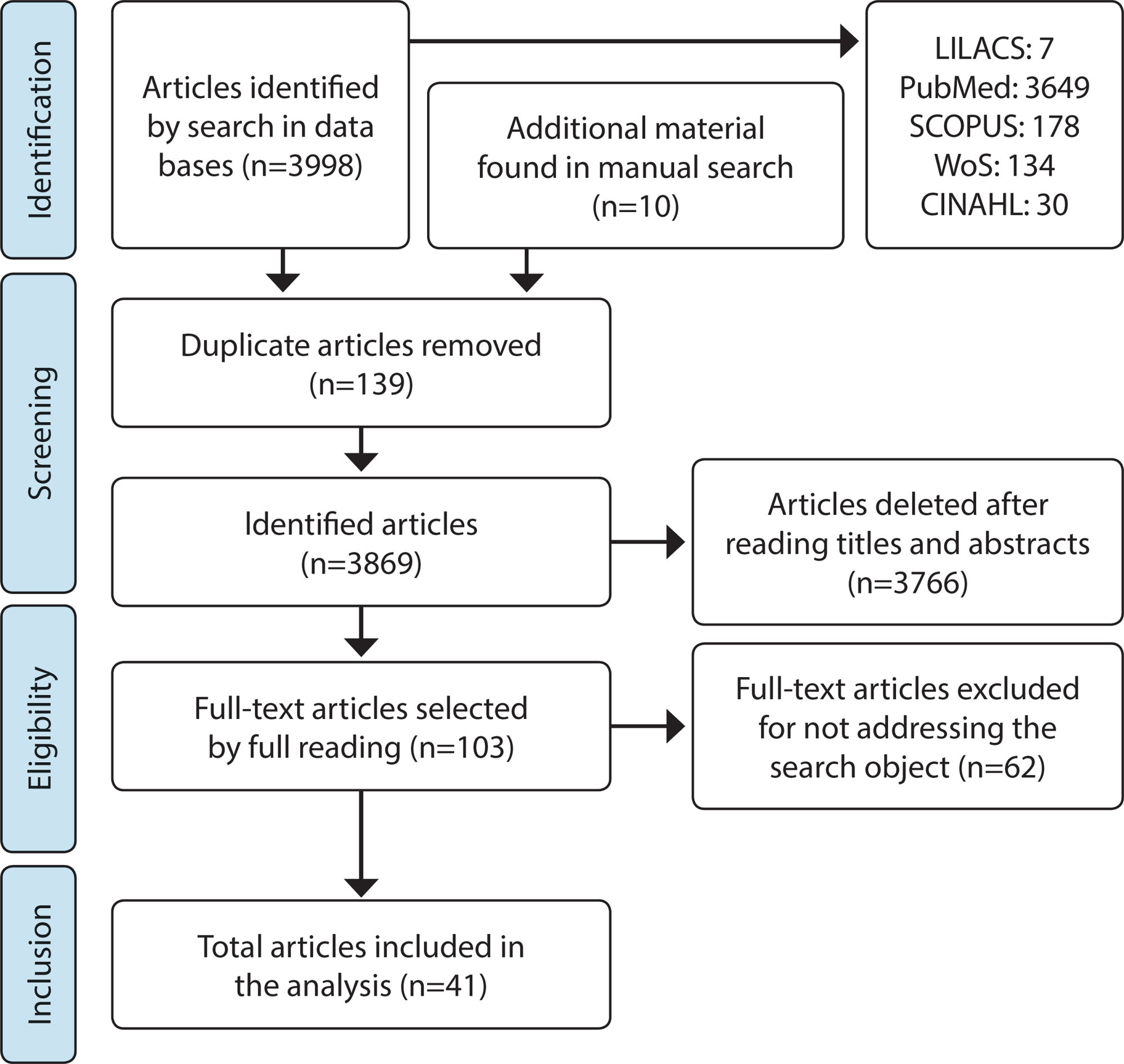
-
REFLECTION
Nursing Process in the Brazilian context: reflection on its concept and legislation
Revista Brasileira de Enfermagem. 2022;75(6):e20210898
05-11-2022
Abstract
REFLECTIONNursing Process in the Brazilian context: reflection on its concept and legislation
Revista Brasileira de Enfermagem. 2022;75(6):e20210898
05-11-2022DOI 10.1590/0034-7167-2021-0898
Views0ABSTRACT
Objectives:
to reflect on the global understanding of the Nursing Process concept, with emphasis on the Brazilian context.
Methods:
a reflection article, aligned with the vision and expertise of researchers who are members of the Nursing Process Research Network.
Results:
the reflection is presented in two main topics: The evolution of Systematization of Nursing Care X Nursing Process concepts and its consonance with national and international practices, and Brazilian legislation; The Nursing Process concept realignment in Brazilian legislation in line with current care, teaching and research practices. Final Considerations: the reflections were oriented to the Nursing Process’ conceptual, normative and legal issues, including elements of its historical evolution, and, with that, pointed to the need to modify the Brazilian regulation on the Nursing Process.
Keywords:Education, NursingLegislationNursingNursing CareNursing ProcessStandardized Nursing TerminologySee more -
ORIGINAL ARTICLE
Creation and validation of a visual educational technology content for lactation physiology learning
Revista Brasileira de Enfermagem. 2020;73(6):e20190564
09-07-2020
Abstract
ORIGINAL ARTICLECreation and validation of a visual educational technology content for lactation physiology learning
Revista Brasileira de Enfermagem. 2020;73(6):e20190564
09-07-2020DOI 10.1590/0034-7167-2019-0564
Views0ABSTRACT
Objective:
to create and validate a visual educational technology content for lactation physiology learning.
Method:
a methodological study that contemplated the stages of content creation and validation guided by the conceptual model of Knowledge Translation into action. The creation took place in partnership with the educational technology center of the project’s home institution. The validation was attended by 27 judges with experience in the obstetric, neonatal, pediatric or maternal and child areas and in the theme of breastfeeding.
Results:
an educational technology covered animation and video techniques to locate, respectively, elements of lactation physiology and the population involved. An Overall Content Validity Index of 0.84 was obtained.
Conclusion:
the visual educational technology for lactation physiology learning has been validated in content as a tool to introduce the theme and mediate health education actions that can have a positive impact on breastfeeding.
Keywords:Audiovisual ResourcesEducational TechnologyHealth EducationLactationTranslational Medical ResearchSee more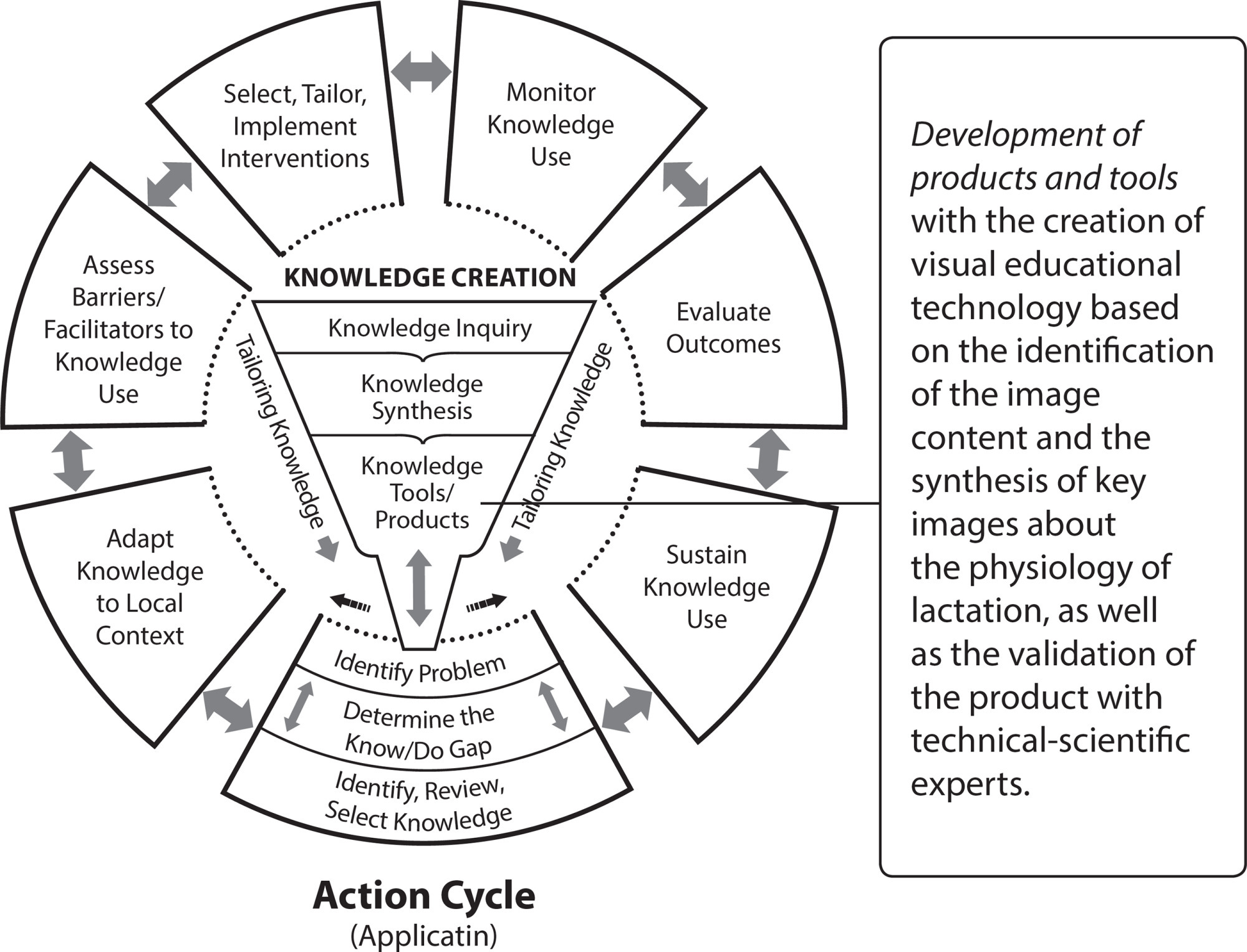
-
ORIGINAL ARTICLE
Risk of suicide among nursing students
Revista Brasileira de Enfermagem. 2021;74(6):e20200867
08-20-2021
Abstract
ORIGINAL ARTICLERisk of suicide among nursing students
Revista Brasileira de Enfermagem. 2021;74(6):e20200867
08-20-2021DOI 10.1590/0034-7167-2020-0867
Views0See moreABSTRACT
Objectives:
to identify the risk and degree of risk of suicide in nursing students of a public institution in the countryside of Pernambuco, Brazil.
Methods:
this was a cross-sectional, quantitative research conducted with 150 students. For data collection, a sociodemographic questionnaire and the instrument, M.I.N.I. – Brazilian version 5.0.0 – Module C – Risk of suicide were used. Statistical analyses were performed with IBM(® )SPSS(®), version 23.
Results:
53.3% of nursing students had a risk of suicide, of which 20.7% had a high risk. Moreover, 22.67% reported previous suicide attempt. It is noteworthy that students without a partner have a higher risk of suicide (56.8%) than those with a partner (29.4%).
Conclusions:
it is perceived the need to develop programs that identify students at risk of suicide in higher education institutions, in order to raise awareness of the problem and implement policies to promote mental health in the academia.
Search
Search in:
Nuvem de Tags
Aged (144) Atenção Primária à Saúde (239) COVID-19 (104) Cuidados de Enfermagem (269) Educação em Enfermagem (151) Educação em Saúde (139) Enfermagem (930) Estudos de Validação (131) Health Education (144) Idoso (208) Mental Health (149) Nursing (987) Nursing Care (306) Patient Safety (151) Primary Health Care (284) Qualidade de Vida (104) Quality of Life (106) Saúde Mental (145) Segurança do Paciente (150) Validation Studies (108)



